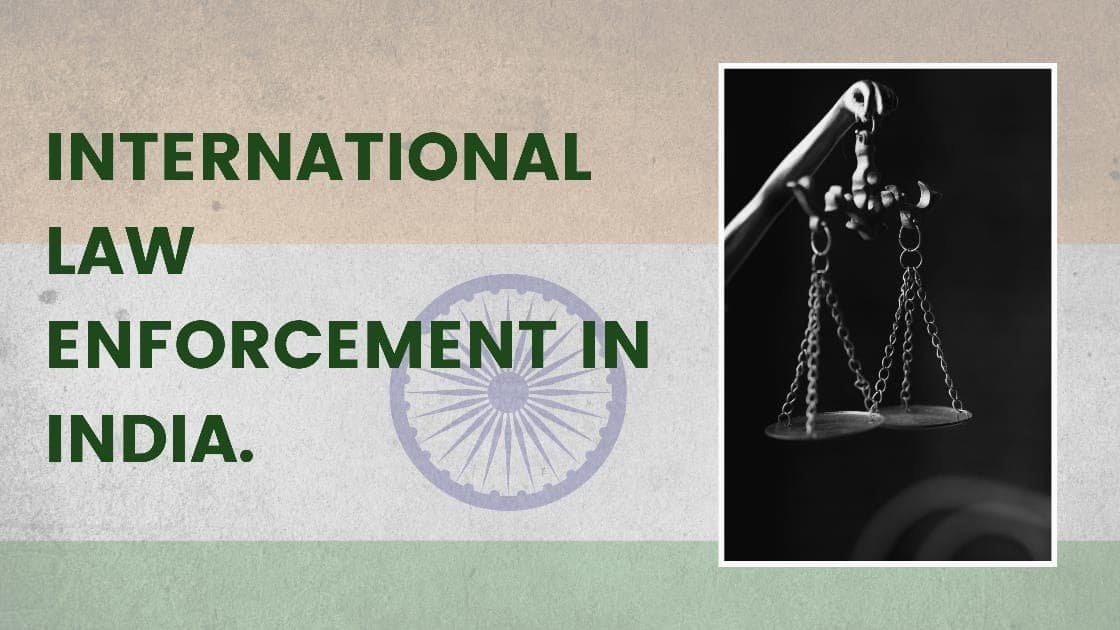International Law Enforcement in India
International Law is known to us by different names such as Inter-State Law, Law of Nations and Public International Law and has many definitions. In addition to this, international law has a traditional as well as a modern definition and there are different versions of these definitions. According to the traditional language, international law is a set of laws and rules and regulations that regulate the relations amongst various countries.

Introduction
International Law is known to us by different names such as Inter-State Law, Law of Nations
and Public International Law and has many definitions. In addition to this, international law
has a traditional as well as a modern definition and there are different versions of these
definitions. According to the traditional language, international law is a set of laws and rules
and regulations that regulate the relations amongst various countries.
The modern definition of international law has not changed so much. According to the modern definition,
international law is a set of laws and rules and regulations that regulate the relations amongst
different countries and the relations amongst various distinct international organizations,
individual non-state entities, and companies.
Unlike the law of the land or National Law, international law does not have a recognized legislature, judiciary or executive. We know that the Local Law or the National law consists of all of the three i.e., legislature, executive and judiciary but international law does not. John Austin has defined international law as a code of rules and conduct of moral force or nature. 3 On the contrary, Hall and Lawrence call
international law a true law. They believe that international law is derived from customs and
precedents which happen to be a source of law. In addition to this, they also believe that
international law is treated as a specific kind of positive law. 4 We shall be discussing how
international law is enforced in India.
India and International Law
India is a party to many conventions and treaties related to international law in the domain of
human rights laws, environmental law, trade laws, space laws, intellectual property laws and many more. We can comprehend the enforcement of international law in India using two different perspectives i.e., international law related to treaties and conventions and international law about international customs. The reason why we have to study the enforcement of international laws in India using two different perspectives is that we follow a dualist theory. India follows a dualist theory 5 of international law, which means that treaties and conventions cannot be invoked unless they are incorporated in the nations domestic laws in the first place.
In view of the provisions laid down by Article 51 of the Indian Constitution, the courts have
held that India is a party to the to these international laws and therefore, international
conventions and treaties should be adopted in good faith. These conventions and treaties are
supposed to be incorporated in the domestic laws automatically except in the cases where the
Indian Constitution needs to be amended. If the Indian Constitution needs to be amended,
these treaties and conventions will not be automatically incorporated into domestic laws. It
should be noted that Customary International Law is not incorporated in the domestic laws
automatically either. The courts of our nation play an imperative role in the enforcement of
international law in India. Article 51 of the Indian Constitution mandates respect international
law in order to maintain friendly and peaceful relations with various foreign countries. It
should be noted that it is not enforceable since it is a DPSP. 7 Clause (c) of Article 51 states
that international law needs to be respected by India and Clause (d) of Article 51 states that in
case any dispute or conflict arises between India and some other foreign country, then it shall
be settled by peaceful means.
Article 253 of the Indian Constitution enables the Parliament of India to make laws
pertaining to international laws in India. Such laws shall be ratified by the President in order
to come into force. The power to implement such laws and treaties and conventions with
respect to international law lies with the Parliament. It should be noted that this power is to be
exercised by the Parliament only and the States do not have a say in it. The laws made by the
Parliament concerning Article 253 of the Indian Constitution will always prevail.
Even the Preamble of India has many morals as well as values that are quite similar to those
of the Universal Declaration of Human Rights i.e., social, economic and political justice for
all the citizens, liberty and equality which shows that our nation has incorporated the
international laws within the law of the land and respects it.
Conclusion
India is a party to several conventions and treaties which are the branches of international
laws. As already discussed, these laws, treaties and conventions are pertaining to human
rights laws, space laws, environment laws, intellectual property laws etc. India follows the
dualist theory which treats domestic laws and international laws separately. According to it,
international laws will be incorporated within the law of the land only in adherence to the
existing domestic laws in force.
In India, Articles 51 and 253 of the Indian Constitution play a pivotal role in the enforcement of international laws. The State must respect these laws and adopt such laws in order to maintain peaceful and friendly relations with foreign countries, international organizations, associations and bodies. The Constitution of India has provisions that shall enforce international law in India in accordance with the local laws and shall continue to do the same in the future.












